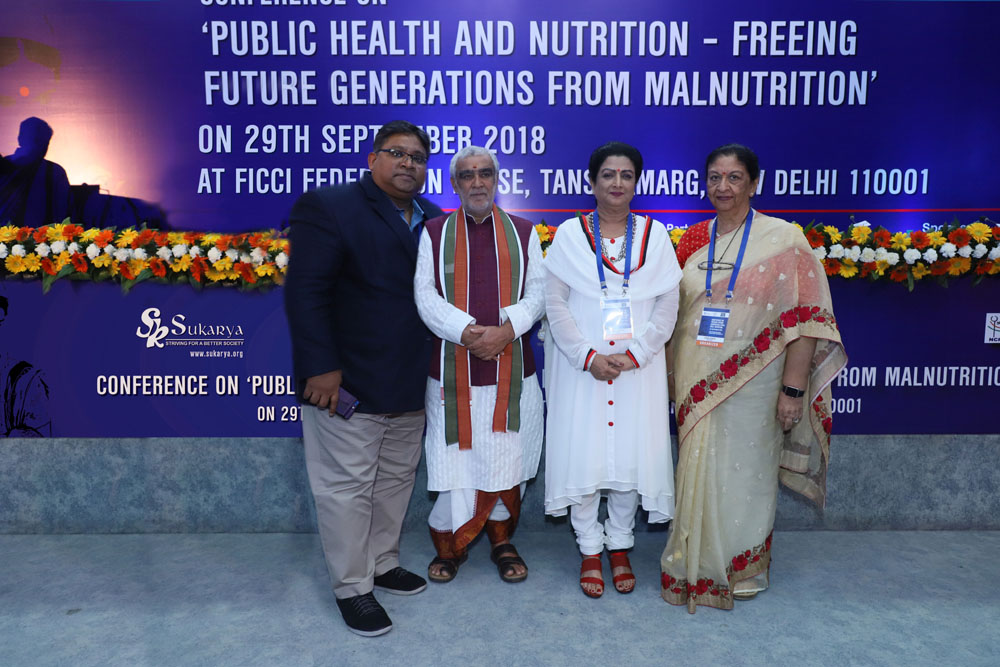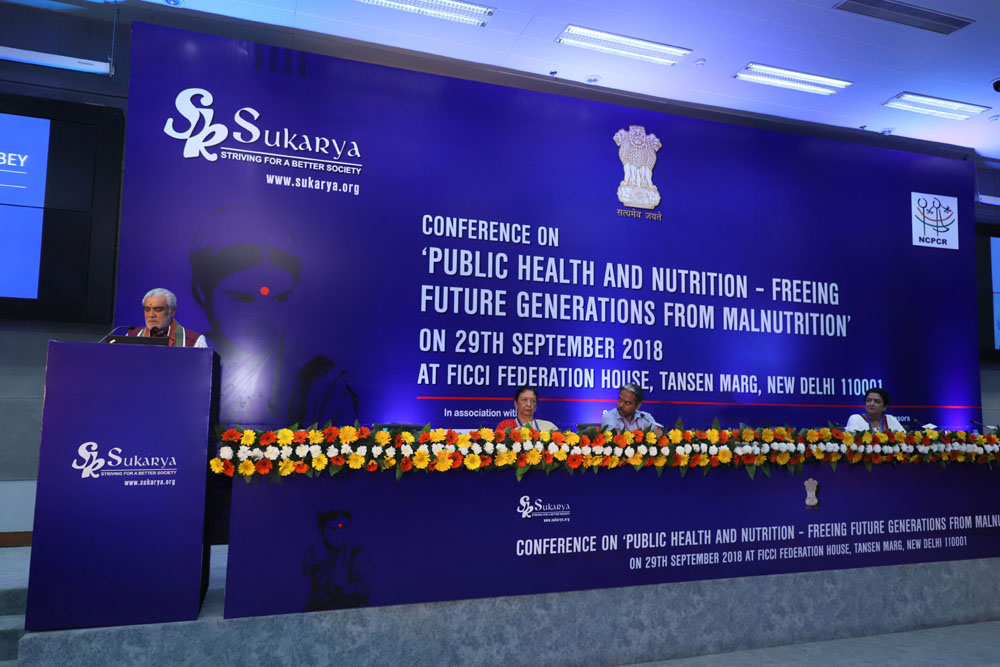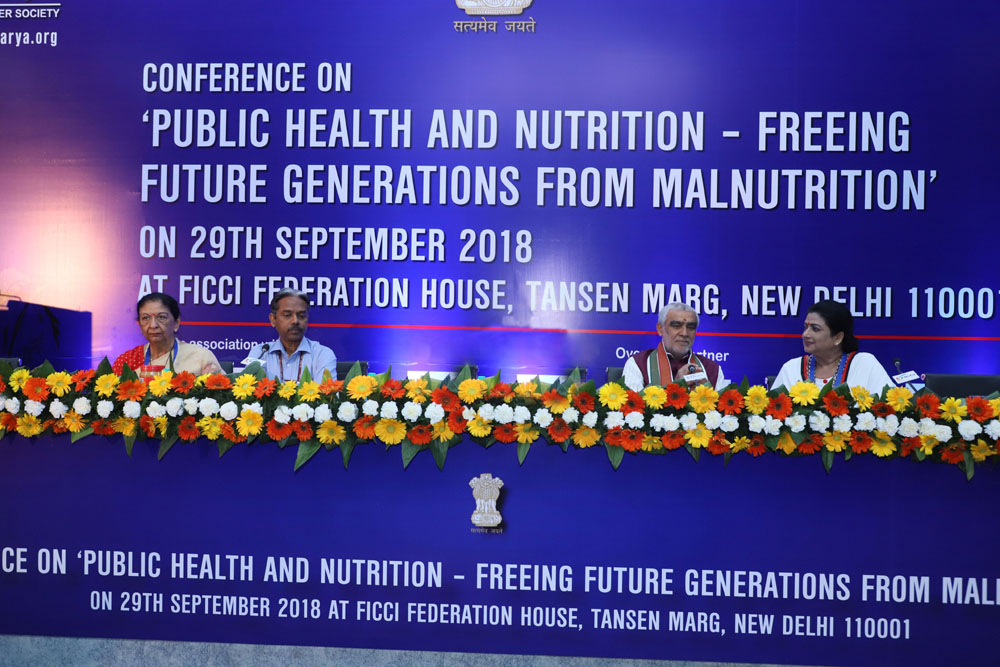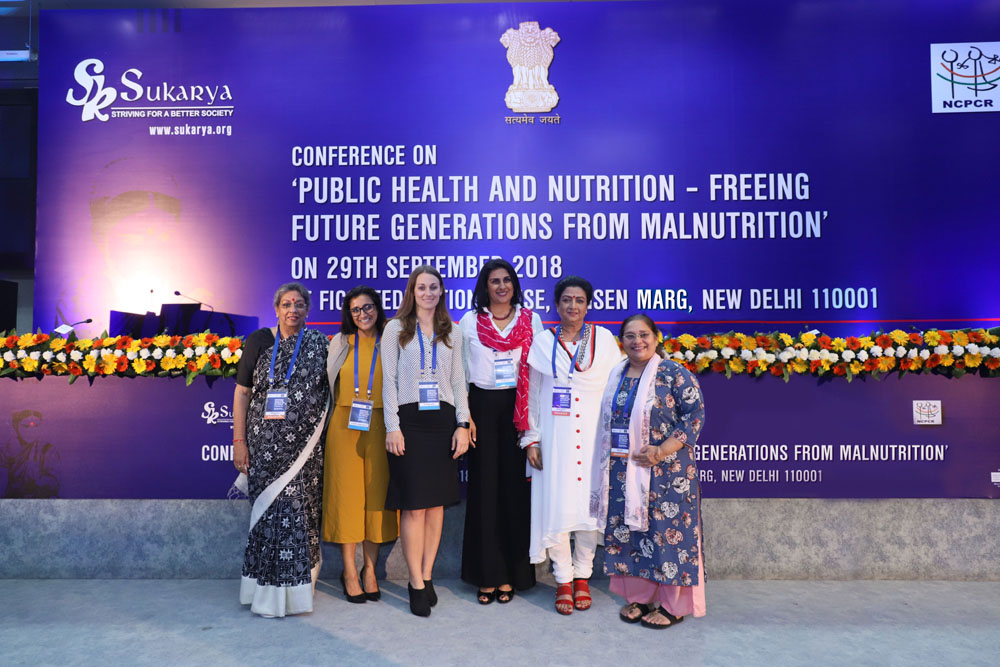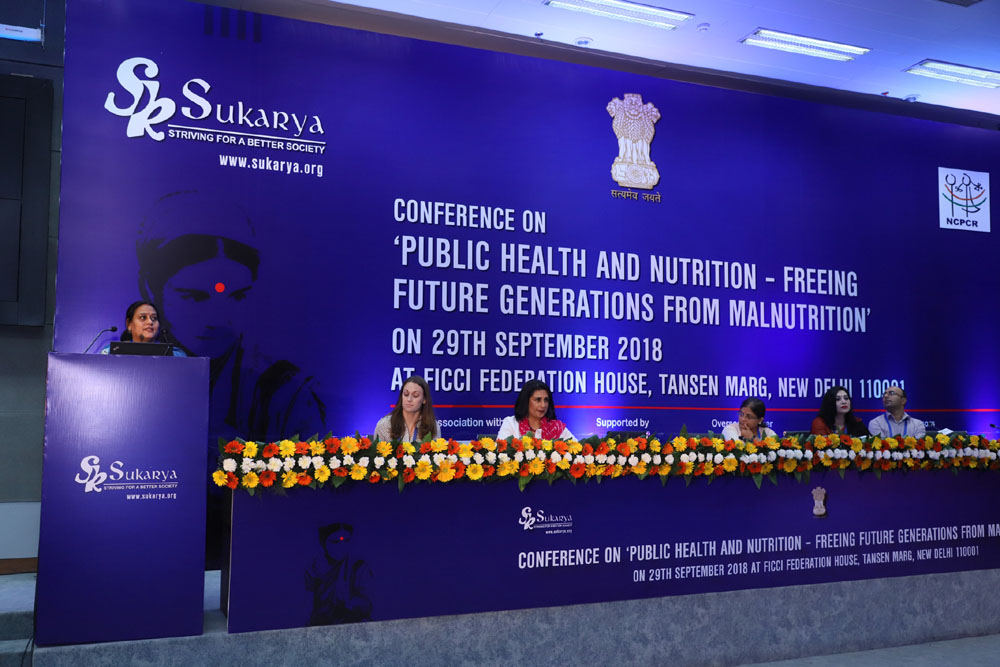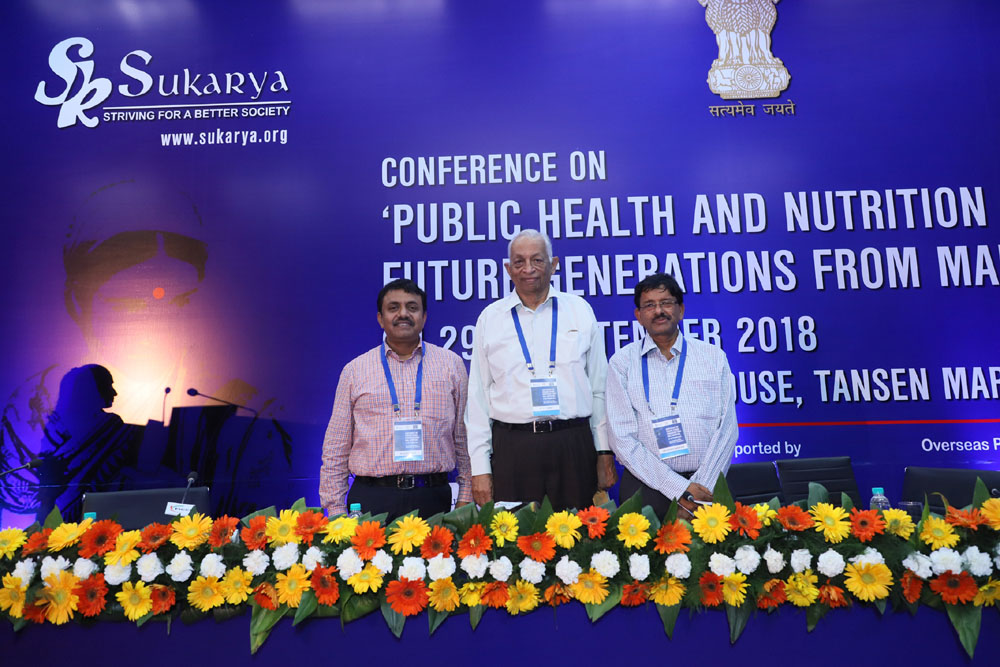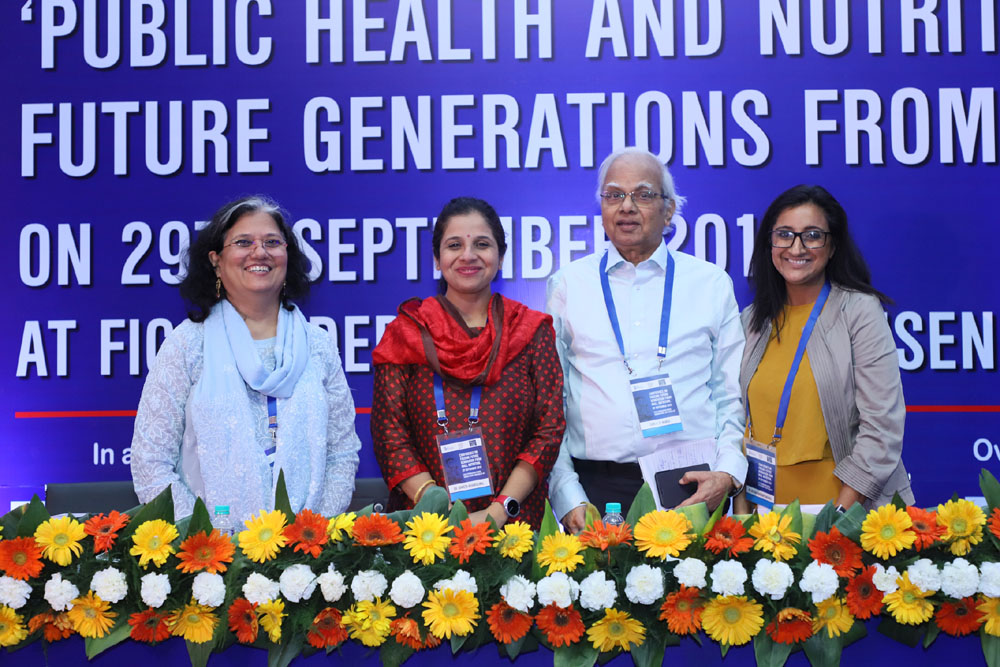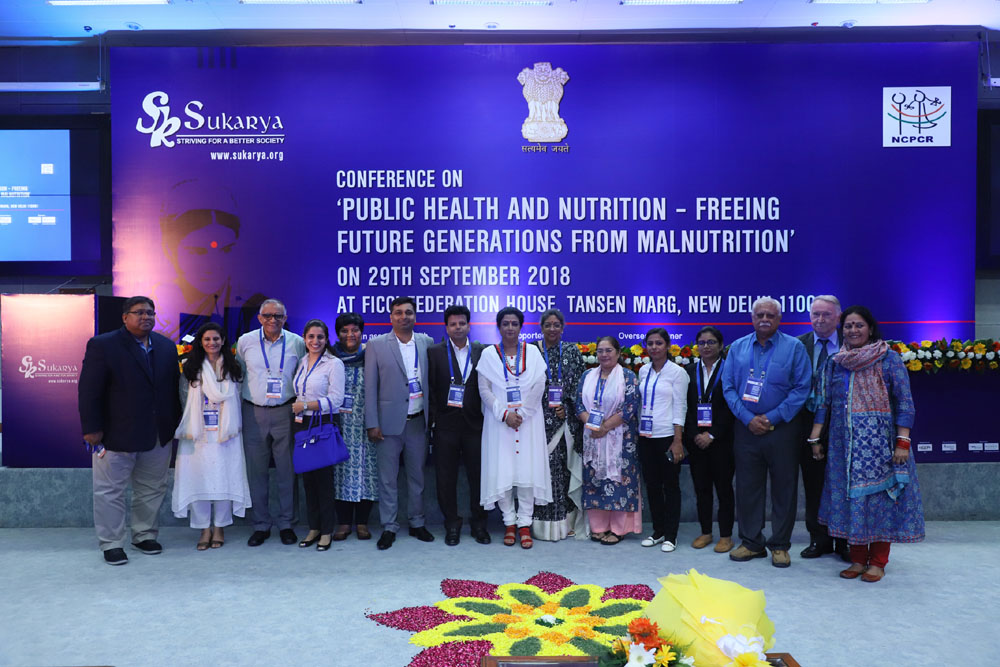Sukarya’s first Conference on “Public Health and Nutrition – Freeing Future Generations from Malnutrition’ on 29th September 2018 at FICCI, was amazing and successful. It delivered what it set out to do. Shri Ashwini Kumar Choubey, Minister of State for Health and Family Welfare was the Chief Guest and Shri Ajay Tirkey, (IAS), Additional Secretary, Ministry of Women and Child Development was the Guest of Honour and Keynote Speaker in the inaugural session.
Sukarya hosted this conference in technical partnership with the National Commission on Protection of Children’s Rights (NCPCR) and in strategic partnership with the Maternal & Child Health program on the Milken School Institute of Public Health at the George Washington University, Washington D.C.
It created a platform to discuss the various aspects of nutritional issues. It envisages to work strategically in collaboration with national and international partners to reduce, control and prevent anemia and malnutrition.
International experts were:
- Amita Vyas, Dr. Megan Landry and Dr. Nitasha Chaudhary Nagaraj from George Washington University, USA;
- Sabrina Husain, Cardiac Surgeon and Registrar, National Institute of Cardiovascular Diseases and Hospital, Bangladesh; and
- Pratik Adhikary, Senior Researcher from Nepal.
Indian experts were:
- Shri Ajay Tirkey, (IAS), Additional Secretary, Ministry of Women and Child Development.
- Rupa Kapoor, Member, National Commission for Protection of Child Rights.
- N.C. Saxena, IAS (Retd.), former Secretary, Planning Commission and Supreme Court Commissioner for monitoring orders related to the implementation of right to food.
- A.R. Nanda, IAS (Retd.), former Secretary Ministry of Health and Family Welfare; Chairman of the Coalition for Food and Nutrition Security.
- Prema Ramachandran, Director, Nutrition Foundation of India.
- Sushma Shende, Programme Director, Child Health and Nutrition, Society for Nutrition, Education & Health Action (SNEHA).
- Shweta Khandelwal, Associate Professor, Public Health Foundation of India (PHFI).
- Pallavi Patel, Director & Founding Member at CHETNA (Centre for Health Education Training and Nutrition Awareness).
- K. Madhavan Nair, Scientist ‘F’ and Head, Micronutrient Research Group, National Institute of Nutrition, Hyderabad.
- Deepti Gulati, Head of Programs, Global Alliance for Improved Nutrition (GAIN).
- Basanta Kumar Kar, Country Director, Project Concern International.
- Sujeet Ranjan, Executive Director, The Coalition for Food and Nutrition (Coalition).
- Avula Laxmaiah, Scientist ‘F’ and Head, Division of Community Studies, National Institute of Nutrition, Hyderabad.
- Dr. Rupal Dalal, Director Health, Shrimati Malati Dahanukar Trust, Mumbai.
- Manjula Krishnan, IES (Retd), former Principal Adviser to Government of India.
- Professor Aasha Kapur Mehta, former Professor of Economics, Indian Institute of Public Administration, New Delhi.
Mrs. Meera Satpathy, Founder and Chairperson of Sukarya in her speech said:
“National Family Health Survey (NFHS – 4) 2015-16 data on malnutrition and anemia shows these are massive numbers to deal with and need equally massive response. This is a wakeup call for all of us to take a very serious attitude and approach towards those who are working relentlessly in these areas.
It is a long term need to free women and children from the prevalence of malnutrition in our society. I consider it is a dire need and foremost priority. So, it is the time to act now.”
As per the report based on the conference held recently in Delhi on “Public Health and Nutrition – Freeing Future Generations from Malnutrition,” compiled by Sukarya, and released by Shri Ashwini Kumar Choubey, Union Minister of State for Health and Family Welfare, more than 40 percent of the world’s stunted children live in India. Stunting is the impaired growth and development that children experience from poor nutrition, repeated infection and inadequate psycho social stimulation. Children are defined as stunted if their height-for-age is more than two standard deviations below the WHO Child Growth Standards median.
As per the Sukarya report, malnutrition estimates are worrying as poor nutrition causes 45 percent of the deaths of children below 5 years and India is home to 40 percent of the world’s stunted, impaired growth and development that children experience from poor nutrition, repeated infection, and inadequate psycho social stimulation. Sixty percent of the malnutrition burden in the country is in the few states of Bihar, Madhya Pradesh, Chhattisgarh, Uttar Pradesh, Andhra Pradesh and Maharashtra. “Government envisages a healthy Ayushman Bharat – a disease-free nation not for any political benefit but for the benefit of people of the country. The government and non-government organizations involved in the fight against malnutrition should use more technology in nutrition and health promotion, and for strengthening the indigenous food habits in the field of maternal and child nutrition,” said Minister Choubey, while releasing the report.
“Sab ka Saath – Sab Ka Vikas” can’t be achieved without freeing our future generations from malnutrition and ensuring good health. Keeping in view that women and children are the core target population of the nutrition campaign and health programs, he said. Commenting on the report findings, Minister Choubey said, “We really applaud the way Sukarya is working and setting an example to make our country malnutrition-free, especially amongst women and children. We will support Sukarya in every way we can and appeal to other organizations to come forward and bring the change at large for our countrymen.”
“The report ‘Public Health and Nutrition – Freeing Future Generations from Malnutrition,’ compiled by NGO Sukarya, which has been working towards improving the health and well-being of underprivileged women and children for more than two decades, aims at safeguarding women and children from malnutrition and anemia in India. The report also recommends the use of modern available technologies to bridge the major gaps and to promote indigenous food habits in maternal and child health and nutrition,” said Ms. Meera Satpathy, founder and chairperson of Sukarya speaking on the occasion.
“The report also seeks to be used as a platform to bring together the policymakers, civil society organizations, practitioners and experts from the field of nutrition and so to synergize efforts and strategic local action towards the issue. This could also offer an opportunity to India’s nutrition policy and a broad-based discussion of priorities for nutrition which will be introduced into policy perspectives and programs,” she said.
“It is our utmost duty to make our nation, especially women and children, free from malnutrition and anemia. Poor nutrition causes 45 percent of deaths amongst children below 5 years of age and the figures are worrisome. I personally feel that it’s the foremost need to work towards making our country malnutrition-free,” Ms. Satpathy added.
“Sukarya is looking forward to scale up and build partnerships with the government and other organizations in the areas of maternal child health, nutrition and adolescent reproductive health to achieve national goals through local initiatives. The consultation helped in developing an understanding on various aspects of nutritional and public health issues and we would like to run some pilot projects in the states like Delhi, Haryana, Rajasthan, Chhatishgarh, Jharkhand and Bihar,” she added.
After the conference, Sukarya and the Maternal & Child Health Program at The George Washington University signed a letter of intent to collaborate on future initiatives focused on new and innovative intervention research to improve maternal and child health outcomes while working towards improving the health of women, adolescents and children in India.

